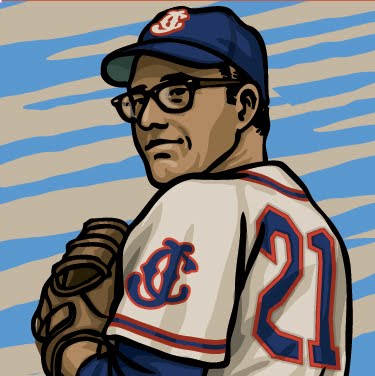The Yankee organization was plenty pleased with Mickey Mantle's freshman performance with the Independence Yankees. In the spring of 1950 Mickey was invited to come to St. Petersburg, Florida where the big club training. Despite no one knowing who this teenager was, the kid from Oklahoma quickly stood out.
Batting left-handed he knocked ball after ball over the left field wall and switching sides he scattered hits all over the field. Even among the Yankee legends on the field, DiMaggio, Berra and Bauer, this kid was something else. After watching one particularly impressive blast, Manager Casey Stengel was said to have cried out "What'sis name? Mantle?" When the Yanks broke camp and headed North, Casey went back to New York dreaming of when this kid would be sitting on his bench.
The Yankee management agreed with Stengel's evaluation and the consensus was that he had the rare skills to be able to skip the many rungs of the minor leagues and go right into AA level, the highest level of the minors (now reclassified as AAA). While the temptation to do so must have been excruciating, cooler heads prevailed and it was decided to bring Mickey along slowly. He was just 18 and known to be somewhat homesick and lacking a strong self-esteem. The Yankees had a Class-B farm team in Joplin, Missouri, less than 30 miles away on the old Route 66. The youngster would have the comfort of staying close to home as well as having a familiar face in the dugout - his manager in Independence, Harry Craft, was also moved up and was taking the helm of the Joplin Minors.
At the Miners' spring training camp in Branson, Missouri Mickey continued to awe with his unprecedented hitting performance. He'd beefed up since the previous season and took to rolling up the sleeves of his flannel jersey to make room for his muscles.
When Lee MacPhail, director of personnel for the organization and son of former Yankees owner Larry MacPhail came to Joplin to watch a pre-season exhibition game, he told friends that Mickey Mantle was the strongest and fastest man in organized baseball. There was talk already around the Yankees front office that this kid was going to be the usurp the mantle of the aging Joe DiMaggio.
Buoyed by one successful season under his belt and glad to be close to his family, Mickey exploded. Encouraged by Harry Craft to swing away, Micky was soon leading the Western Association in almost every offensive department. In a night game in Joplin he smashed one home run left-handed, then turned around and did the same right-handed. It was obvious to his teammates, fans and opposing players that this kid was something special.
Mickey was allowed to go home to his family after games played in Joplin. The kid had begun hanging out at a local pool hall and discovered beer. Manager Harry Craft figured letting the kid go home every night to his family would help keep him straight. But having his family close was a double-edged sword. After on game where he went 3 for 4 with a home run, his father Mutt told him that he would have got 4 hits had he hustled on a ground ball. The kid had a quick temper as well which he directed at himself, always believing he could do better.
The only problem was his fielding.
Try as he might, Mickey couldn't seem to improve his play at shortstop. Fly balls were so troubling to him that his own teammates would yell for him to stay away when one came towards short. He committed 55 errors in 137 games and his arm, though strong as hell, was so erratic that legend has it the box seats beyond first base were left empty for fear of getting hit by one of Mickey unpredictable throws.
As the 1950 season came to a close, Mickey could look back on an impressive year. He grabbed hold of the next rung of the Yankee farm system and improved by leaps and bounds over his first season. He was popular with his teammates and fans alike and could bask in all the attention lavished on him. The Yankees, on their way to a repeat pennant that year, rewarded the 18 year-old with a September call-up to the majors. For the final 2 weeks of the 1950 season Mickey watched the big leaguers from the security of the Yankees' dugout. Shy and reserved he couldn't even muster the nerve to talk to idol Joe DiMaggio, the man he was destined to replace. Though he didn't get into a single game, that first experience of being a big league ballplayer would help him get him used to what was ahead.
Like my previous post on Mickey's 1949 season, I'd like to dedicate it to my Uncle Eddie, a great Mickey Mantle fan and the guy who came to my little league games when my father could not. Nick Diunte's article in the Examiner was particularly helpful in this story, check that and his other articles out, he's quite a good writer and focuses on New York City baseball.

